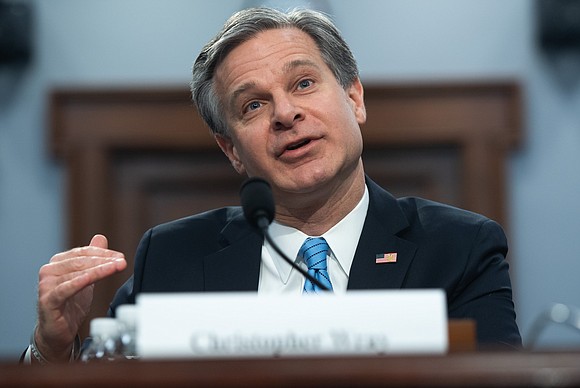FBI Director Wray distances himself from Barr's use of 'spying' on Trump campaign
CNN/Stylemagazine.com Newswire | 5/7/2019, 10:18 a.m.

By David Shortell, CNN
(CNN) -- FBI Director Christopher Wray told a Senate panel Tuesday that the bureau is "working to help" Attorney General William Barr as he reviews the origins of the Russia investigation, but distanced himself from Barr's use of the phrase "spying" at a separate hearing last month.
"Well that's not the term I would use," Wray said.
"Lots of people have different colloquial phrases," he added to a Senate appropriations subcommittee. "I believe that the FBI is engaged in investigative activity and part of investigative activity includes surveillance activity of different shapes and sizes. To me the key question is making sure that it's done by the book consistent with our lawful authorities."
The period of time has come under scrutiny as President Donald Trump and his allies have focused attention on the use of government surveillance, referring to the story as "Spygate."
Appearing before the same Senate panel in April, Barr said "I think spying did occur" on Trump's 2016 presidential campaign.
Wray said he and Barr were staying in "fairly close contact" on the subject.
"Now that the special counsel investigation is completed and having only recently returned to the department the attorney general is seeking to understand better the circumstances at the department and the FBI relating to how this investigation started and we're working to help him get that understanding. I think that's part of his job and part of mine," Wray said.
The Justice Department's inspector general is also reviewing the issue.
Asked by Sen. Jeanne Shaheen, a New Hampshire Democrat, if he had any evidence of illegal surveillance by the FBI into the 2016 presidential campaigns or people associated with the campaigns, Wray said, "I don't think I personally have any evidence of that sort."
Barr drew immediate criticism for his use of the term "spying" from Democrats,who said that the attorney general was mischaracterizing the FBI's counterintelligence investigation in an effort to please Trump.
Testifying before the Senate Judiciary Committee last week, Barr defended his use of the word, telling lawmakers it was done "off the cuff" and calling backlash to it "faux outrage."
"I don't think the word spying has any pejorative connotation at all," Barr said. "I think 'spying' is a good English word that in fact doesn't have synonyms because it is the broadest word incorporating really all forms of covert intelligence collection."
In March 2018, amid calls by Republican lawmakers for a second special counsel to investigate how the Russia investigation began, then-Attorney General Jeff Sessions revealed that he had designated a sitting US attorney to look into allegations that the FBI abused its powers in surveilling former Trump foreign policy aide Carter Page, among other issues.
At the same time, the office of the DOJ inspector general, Michael Horowitz, confirmed it would "review information that was known to the DOJ and the FBI at the time the applications were filed from or about an alleged FBI confidential source" and "review the DOJ's and FBI's relationship and communications with the alleged source as they relate to the (Foreign Intelligence Surveillance Court) applications."
A US official last month could not explain to CNN how the investigation by the US attorney, John Huber, factored into the Barr review.
Barr said he expected Horowitz's review will be completed in May or June.
Russian meddling in 2020
On Tuesday, Wray said Russian attempts to sow "divisiveness and discord" in the US were "alive and well," though he could not say if the goal of the Russians was to support Trump's 2020 presidential campaign, as special counsel Robert Mueller's report concluded was the case ahead of the 2016 election.
"I don't know that I think we have the answer to that at the moment," Wray said of a potential Russian preference for Trump's re-election. "We continue to assess that the Russians are focused on sowing divisiveness and discord in this country and pitting us against each other, and I think that part we see alive and well."
In addition to counterintelligence operations, Wray told Senate appropriators that cyber threats and transnational organized crime were among the top priorities for his funding requests.
Wray said the cyber threat "has grown exponentially" in terms of actors, methods and targets. "We need personnel and tools there in a big, big way."






